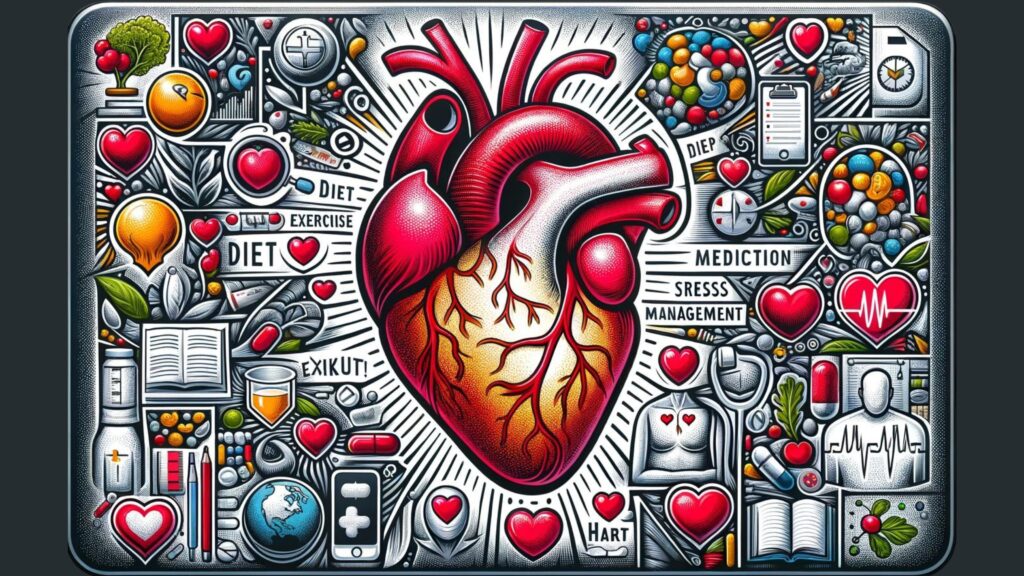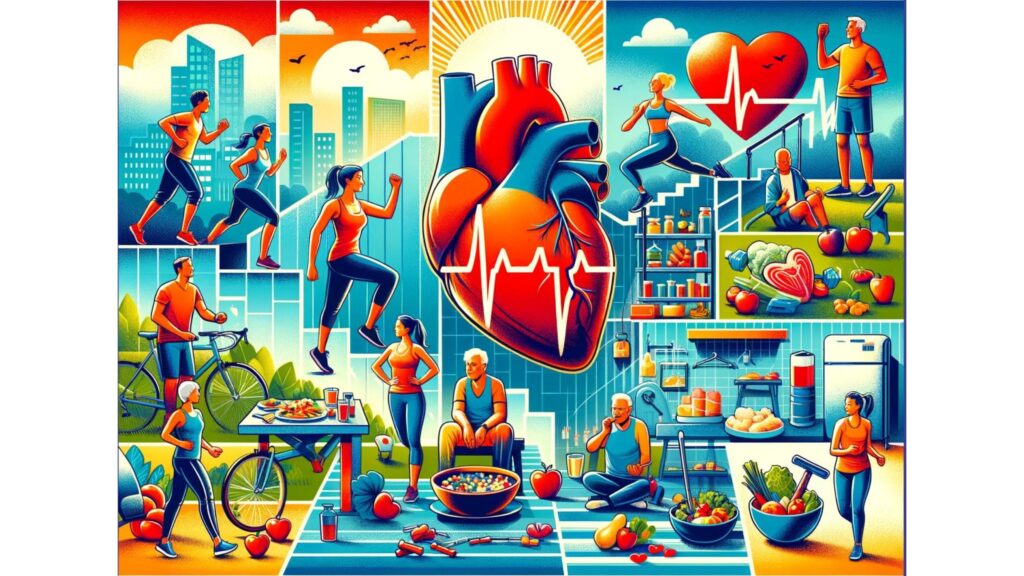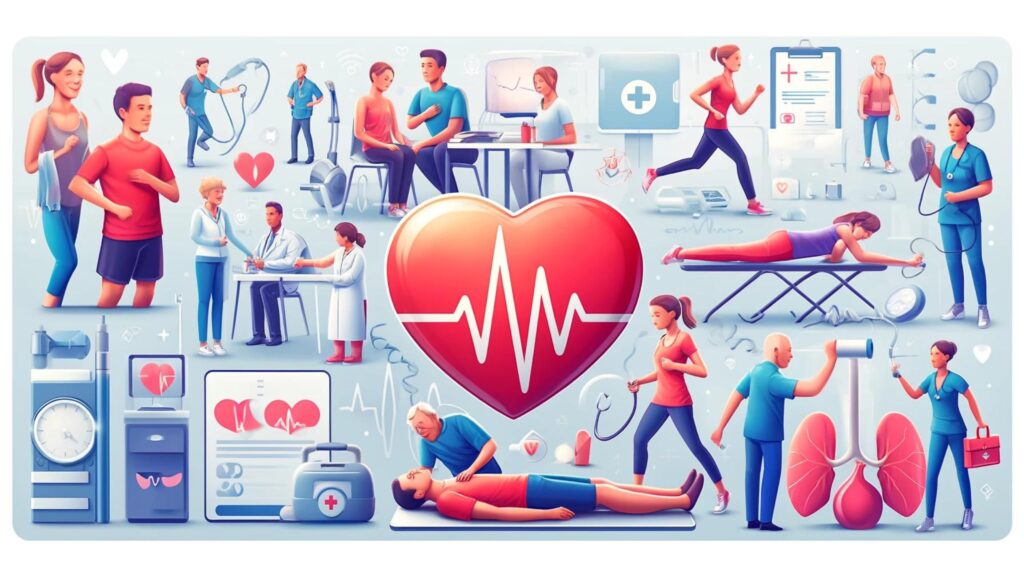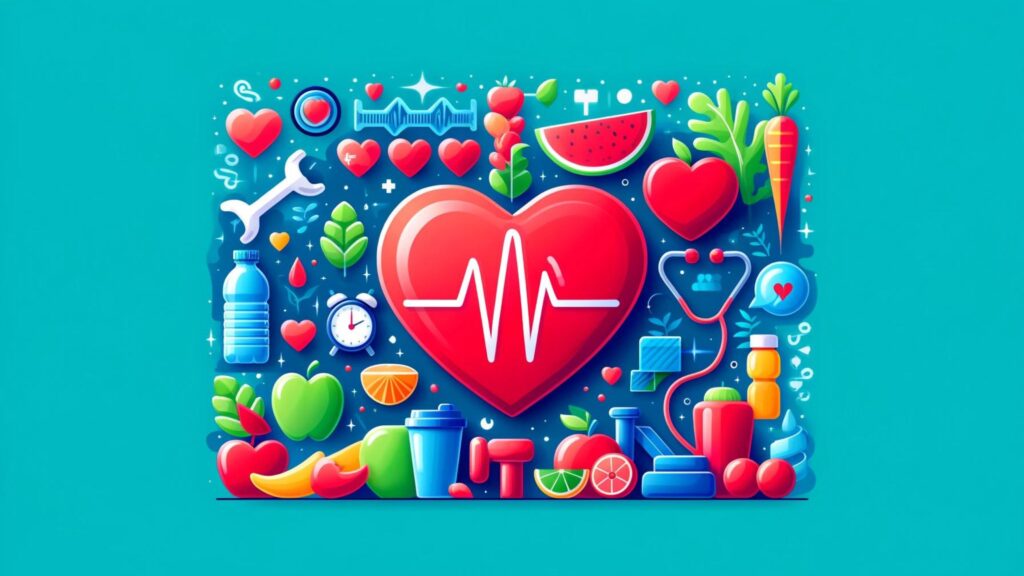In the vast realm of wellness, heart health is a critical component of longevity. This essential guide delves deeply into the mechanics of cardiovascular vitality, providing a beacon for those looking to strengthen their arterial fortresses. As arteries pulsate with vigor, our guide walks us through dietary strategies and exercises that are critical for maintaining a healthy cardiac rhythm.
Heart health is more than just avoiding illness; it is also about living a lifestyle that maximizes your well-being. With meticulous attention to groundbreaking research and holistic practices, we carve a path to long-term vitality, ensuring your heart beats as strongly tomorrow as it does now. Accept this journey with our profound insights and turn your heart health into a testament to a thriving life.
- Core Components of Heart Health
- Understanding the fundamentals of heart health
- Heart Health Medication: Types and Uses
- Diet Essentials: A Nutritional Guide to Heart Health
- Exercise and Heart Health: Best Practices
- Sleep's Impact on Heart Health: A Deep Dive
- Stress Effects on Heart Health: Managing Risks
- Heart health screening: when and why
- Heart Disease: Symptoms and Early Diagnosis
- Heart Health Supplements: Benefits and Risks
- Genetic Factors in Heart Health: Understanding Your Risk
- Mental and emotional factors
- Mental Health and Heart Health: Exploring the Relationship
- Mindfulness and Heart Health: Practical Tips
- Emotional Wellness and Heart Function
- Stress management strategies for heart health
- Effects of Depression and Anxiety on Heart Health
- Yoga and meditation: benefits for the heart
- Therapeutic approaches to mental health for cardiac patients
- Strategies for coping with stress and heart health
- Psychological Counseling for Heart Disease
- Support Systems' Role in Heart Health
- Demographic Specifics
- Women's Heart Health: Special Concerns and Care
- Men and Heart Disease: Addressing Risk Factors
- Pediatric Heart Health: Guidelines and Care
- Senior heart health: specialized approaches
- Heart Health for Athletes: Performance and Maintenance
- Cultural Effects on Heart Health
- Gender Variations in Heart Health: Symptoms and Treatments
- Heart Health During Pregnancy: Essential
- Youth and Heart Health: Establishing a Foundation
- Heart Health in Diverse Populations: Understanding Variability
- Lifestyle Adjustments
- Dietary Changes for Better Heart Health
- Alcohol and Heart Health: Evaluating the Effects
- Smoking and its Effects on Heart Health
- Routine Activities That Promote Heart Health
- Heart-Healthy Recipes: Cooking for Vitality
- Obesity and Heart Health: Management Strategies
- Environmental Effects on Heart Health
- Air pollution and cardiovascular disease
- Seasonal Differences in Heart Health
- Travel tips for heart patients
- Medical and technological advancements
- Recent Progress in Heart Health Treatments
- Heart health and biotechnology: emerging trends
- Wearable technology for heart monitoring
- Innovative heart health apps and tools
- Telehealth's Impact on Cardiac Care
- Robotic surgery and cardiac health
- Genetic testing and personalized heart care
- Using artificial intelligence to diagnose heart disease
- Heart Health Research: New Frontiers
- The Future of Heart Care: Predictions and Developments
- Preventative and emergency care
- Emergency Response to Heart Problems: Immediate Actions
- First Aid for Heart Attacks: Essential Steps
- Preventative Strategies for Heart Disease
- Cardiac Rehabilitation Programs: Overview
- Heart Checkups: Frequency and Importance
- CPR Training: Importance and Techniques
- Prepare for Heart Health Emergencies.
- Insurance and Access to Heartcare
- Building a Heart Emergency Response Kit
- Community Resources for Heart Health Emergencies
- Global Perspectives and Policies
- Heart Health: A Global Challenge
- Comparative studies of heart health across nations
- Public Health Policy and Heart Health
- International Heart Health Awareness Campaigns
- Access to Heart Health Care Globally
- Heart Health Nonprofits: Their Impact
- The influence of cultural practices on heart health is significant.
- Global Trends in Heart Health Strategies
- Collaborative International Heart Health Research
- The World Health Organization is working with Heart Health Initiatives.
- Advanced Topics and Special Interests
- Cardiovascular Pharmacology: Deep Dive
- Advanced Surgical Techniques for Heart Disease
- Chronic Conditions and Heart Health: Handling Multiple Issues
- Integrative Medicine for Heart Health
- Alternative treatments for heart health
- Nutraceuticals and Their Effects on Heart Health
- Experimental Treatments in Cardiology
- Ethical Concerns in Heart Health Care
- Professional Athletes' Heart Health Management
- Rare Heart Conditions: Case Studies and Reports
- Professional Step-by-Step Guide to Heart Health: Your Essential Guide to Lifelong Vitality
- Frequently Asked Questions: Heart Health: An Essential Guide to Lifelong Vitality.
- Conclusion

Core Components of Heart Health
Understanding the fundamentals of heart health
Heart health is essential for living a full and healthy life. Understanding its fundamentals entails understanding the mechanics of a properly functioning cardiovascular system, in which the heart works tirelessly to pump blood, delivering oxygen and nutrients to tissues. Understanding these fundamentals reveals the critical role of consistent, moderate exercise and a well-balanced diet rich in omega-3 fatty acids, antioxidants, and fibers—essential for maintaining the structural and functional integrity of cardiac cells.
Heart Health Medication: Types and Uses
Navigating the world of heart health medications reveals a variety of agents, each designed to address a specific cardiac issue. Beta-blockers slow the heartbeat to reduce the force of contractions, aiming to lower blood pressure and heart workload. By lowering angiotensin levels, ACE inhibitors expand blood vessels and decrease resistance, reducing the workload on the heart and increasing blood flow. Understanding when and how to use these medications is critical for effective heart health management.
Diet Essentials: A Nutritional Guide to Heart Health
A heart-healthy diet is an effective way to prevent cardiovascular disease. Lean proteins, whole grains, and a variety of fruits and vegetables are important components, as they are high in essential nutrients while low in heart-clogging fats and cholesterol. Incorporating foods high in omega-3 fatty acids, such as salmon and antioxidant-rich blueberries, can significantly improve cardiovascular resilience to disease.
Exercise and Heart Health: Best Practices
Exercise is essential for heart health, with at least 150 minutes of moderate aerobic activity or 75 minutes of vigorous activity per week being the gold standard. We recommend combining cardio and strength training to enhance heart and lung fitness, as well as improve muscular health and stamina. Consistency and a gradual increase in exercise intensity are key strategies for keeping the heart in peak condition.
Sleep’s Impact on Heart Health: A Deep Dive
The complex interplay between sleep and heart health is profound. Quality sleep promotes heart health by regulating the heart’s repair processes and hormonal balance. Poor sleep patterns can increase the risk of cardiovascular disease by promoting conditions such as hypertension and an irregular heartbeat. Getting 7-9 hours of uninterrupted sleep is critical for maintaining an optimal heart condition.
Stress Effects on Heart Health: Managing Risks
Chronic stress harms the heart by causing chemical reactions that inflame heart tissues and constrict blood vessels, increasing the risk of heart disease. Mindfulness, yoga, and deep breathing exercises are examples of effective stress management techniques that promote a calm, centered state that is beneficial to heart health.
Heart health screening: when and why
Regular heart health screenings are critical for the early detection and treatment of potential cardiovascular problems. We recommend these screenings, which include blood pressure checks, cholesterol profiles, and body mass index (BMI) assessments, annually for adults over the age of 20. Early detection through these screenings can help to prevent more serious heart conditions.
Heart Disease: Symptoms and Early Diagnosis
Recognizing heart disease symptoms, such as chest pain, shortness of breath, and extreme fatigue, can save lives. Early detection through regular check-ups and awareness of your body’s signals is critical for managing and potentially reversing the progression of heart disease. Awareness and proactive management are critical defenses against this widespread health threat.
Heart Health Supplements: Benefits and Risks
Carefully choosing supplements can benefit heart health. Studies have demonstrated that omega-3 fatty acids, magnesium, and coenzyme Q10 enhance heart function and reduce the risk of cardiovascular disease. However, indiscriminate use without professional guidance can result in negative effects, emphasizing the importance of consulting with healthcare providers before beginning any supplement regimen.
Genetic Factors in Heart Health: Understanding Your Risk
Genetic predisposition has a significant impact on an individual’s cardiovascular health. A family history of heart disease significantly increases one’s risk, so genetic consultation and/or genetic testing is a prudent step for those with a significant family history. Knowing your genetic risk can guide your lifestyle and medical interventions specifically designed to reduce these inherited risks.

Mental and emotional factors
Mental Health and Heart Health: Exploring the Relationship
There is an inextricable link between mental and cardiovascular health. Mental health disorders, such as depression and anxiety, can exacerbate heart disease by promoting inflammatory responses and hormonal imbalances that harm the heart. Understanding this connection is critical for developing holistic treatment plans that address both the mind and the heart, emphasizing the importance of integrated care approaches in promoting overall well-being.
Mindfulness and Heart Health: Practical Tips
Mindfulness practices have shown promise for significantly lowering stress levels, which improves heart health. Focusing on your breath, engaging in guided imagery, and practicing mindful eating are examples of simple, practical mindfulness exercises. These activities help to center thoughts, calm the mind, and reduce the physiological effects of stress on the cardiovascular system, resulting in a healthier heart rhythm and blood pressure.
Emotional Wellness and Heart Function
Emotional well-being is critical for maintaining a healthy heart. Positive emotions help to regulate hormone levels and lower inflammatory markers, both of which are important for cardiovascular health. In contrast, emotional turmoil can cause cardiac stress. We can view promoting emotional health through activities that promote happiness and relaxation, like spending time outdoors or with loved ones, as direct investments in heart health.
Stress management strategies for heart health
Effective stress management is a critical component of heart health. Progressive muscle relaxation, deep breathing exercises, and engaging in hobbies can all help to relieve stress-related heart strain. Tailoring these techniques to individual lifestyles allows for long-term benefits and lowers the risk of heart disease.
Effects of Depression and Anxiety on Heart Health
Depression and anxiety affect not only the mind but also the heart, increasing the risk of hypertension, arrhythmia, and even heart attack. Managing these conditions with professional assistance, medication, and therapy can reduce the risks. Raising awareness of these mental health issues’ signs and symptoms is critical for timely intervention and heart health preservation.
Yoga and meditation: benefits for the heart
Yoga and meditation have significant benefits for both mental and cardiovascular health. Regular practice can help reduce stress, increase respiratory strength, and improve heart rate variability. These disciplines foster a deep sense of calm and stability, allowing the heart and mind to flourish together.
Therapeutic approaches to mental health for cardiac patients
Cardiac patients frequently experience unique mental health challenges, necessitating specialized therapeutic approaches. Cognitive-behavioral therapy (CBT) and cardiac rehabilitation programs with mental health components can be beneficial. These therapies aim to change negative behavioral patterns that affect heart health, such as smoking or inactivity, while also increasing psychological resilience.
Strategies for coping with stress and heart health
Maintaining heart health requires the development of strong stress-coping strategies. Setting realistic goals, maintaining social connections, and putting self-care first are all possible strategies. These help to reduce the effects of stress and provide a protective barrier against heart disease.
Psychological Counseling for Heart Disease
Psychological counseling can help manage heart disease by addressing the mental aspects of the condition. Counseling provides a supportive environment in which to experiment with effective stress-reduction techniques, and it can help patients adjust to or change lifestyle habits that affect heart health.
Support Systems’ Role in Heart Health
Support systems are essential for heart health because they provide emotional comfort as well as practical assistance in the management of cardiovascular disease. Social support can improve health outcomes by reducing feelings of isolation and providing motivation to recover. Encouraging patients to form and maintain strong support networks can be just as important as any medical intervention in ensuring heart health.

Demographic Specifics
Women’s Heart Health: Special Concerns and Care
Women face unique heart health challenges, frequently displaying symptoms and conditions that differ significantly from those seen in men. Issues such as heart disease manifest more subtly and are frequently misdiagnosed or underestimated. Recognizing these distinct patterns and advocating for gender-specific research and treatment protocols are essential components of effective women’s care. Ensuring that women receive tailored advice and screening can significantly improve outcomes and provide the necessary protection against cardiovascular diseases.
Men and Heart Disease: Addressing Risk Factors
Men are traditionally more likely than women to develop heart disease at a young age. Preventive care for this demographic focuses on controlling key risk factors such as hypertension and high cholesterol, as well as proactively managing lifestyle habits such as smoking and sedentary behavior. Targeted health strategies and regular screenings can significantly reduce the incidence of heart disease in men, highlighting the importance of awareness and early intervention.
Pediatric Heart Health: Guidelines and Care
Ensuring children’s heart health lays the groundwork for a healthier adulthood. Pediatric heart care focuses on the early detection of congenital heart defects and the development of healthy habits at a young age. Guidelines for pediatric heart health emphasize proper nutrition, adequate physical activity, and regular pediatric check-ups to track developmental progress and prevent potential heart problems from worsening.
Senior heart health: specialized approaches
Individuals’ hearts undergo a variety of changes as they age, increasing their risk of cardiovascular disease. Senior-specific approaches include managing age-related conditions like arteriosclerosis and atrial fibrillation with appropriate medication, lifestyle changes, and regular cardiac assessments. Tailored heart care for the elderly can significantly improve their quality of life and longevity.
Heart Health for Athletes: Performance and Maintenance
Athletes require optimal heart function to maintain high levels of physical activity. Regular cardiovascular evaluations, including stress tests, are required to maintain athlete heart health. We should also monitor for signs of overtraining syndrome, which can strain the heart. To avoid cardiac fatigue, athletes should balance intense training with adequate recovery periods.
Cultural Effects on Heart Health
Heart health practices and heart disease prevalence vary greatly across cultures due to differences in diet, lifestyle, and health care practices. Understanding these influences can help guide culturally competent care and targeted health education that respects and incorporates ethnic and cultural differences, ultimately improving heart health outcomes in diverse populations.
Gender Variations in Heart Health: Symptoms and Treatments
We can see gender differences in heart health in symptoms, treatment responses, and outcomes. Women may experience less common symptoms, such as nausea and fatigue, which can lead to delays in diagnosis. Recognizing these differences is critical for accurate diagnosis and treatment, ensuring that both men and women receive the best care possible based on their physiological differences.
Heart Health During Pregnancy: Essential
Pregnancy poses unique challenges to heart health because a woman’s body adapts to support fetal development. This includes controlling the increased cardiac output and monitoring for pregnancy-induced hypertension. Heart health during pregnancy includes regular prenatal check-ups, blood pressure management, and monitoring for signs of gestational diabetes, all of which are critical for both mother and child’s health.
Youth and Heart Health: Establishing a Foundation
Instilling heart-healthy habits in children is critical for preventing future heart disease. Educational initiatives that encourage active lifestyles and healthy eating can help prevent the onset of heart disease. Programs that encourage youth physical activity and nutritional literacy play an important role in laying the groundwork for lifelong heart health.
Heart Health in Diverse Populations: Understanding Variability
Genetic, socioeconomic, and environmental factors all contribute to variation in heart health among different populations. Tailored health interventions that take into account these various factors are required to effectively address and manage heart health across different demographics. Understanding and incorporating these variables into heart health programs ensures that everyone receives equitable and effective care.

Lifestyle Adjustments
Dietary Changes for Better Heart Health
To strengthen the heart, dietary changes are essential. A diet low in saturated fats, trans fats, and cholesterol but high in whole grains, fruits, and vegetables can lower your risk of heart disease. Consuming heart-healthy foods such as nuts, legumes, and lean proteins can lower blood pressure and improve lipid profiles. This strategic nutritional overhaul protects the heart while also improving overall metabolic health, demonstrating the importance of diet as a cornerstone of cardiac care.
Alcohol and Heart Health: Evaluating the Effects
Studies have linked moderate alcohol consumption to potential heart benefits, especially red wine, which is believed to help increase good cholesterol levels. However, excessive drinking can have negative consequences, such as hypertension and irregular heart rhythms. Weighing these effects carefully entails understanding individual health profiles and consumption habits, as well as ensuring that alcohol intake remains within healthy limits in order to support rather than jeopardize heart health.
Smoking and its Effects on Heart Health
Smoking is a significant risk factor for a variety of heart conditions, including coronary heart disease and vascular disease. It reduces heart function by tightening major arteries and creating an environment conducive to atherosclerosis. Quitting smoking is one of the most beneficial lifestyle changes for heart health, as it leads to improved circulation, better oxygenation, and significantly lower heart disease risks within a few years of stopping.
Routine Activities That Promote Heart Health
Walking, cycling, and swimming can all help improve cardiovascular fitness. These activities promote a healthy weight, lower blood pressure, and strengthen the heart muscle. Making these activities a regular part of your daily routine can improve your heart health, demonstrating that small, consistent changes are essential for long-term wellness.
Heart-Healthy Recipes: Cooking for Vitality
Creating nutritious and heart-healthy meals can be both enjoyable and beneficial. A simple recipe, such as grilled salmon with quinoa and steamed broccoli, can be a delicious way to promote heart health. Begin by marinating the salmon in a mixture of olive oil, lemon juice, garlic, and herbs. Grill the salmon for 6–8 minutes on each side, then serve with cooked quinoa and fresh steamed broccoli. These recipes provide the diet with omega-3 fatty acids, fiber, and essential nutrients, all of which are known to improve heart function.
Obesity and Heart Health: Management Strategies
Obesity strongly links to heart disease, primarily through its effects on blood pressure, cholesterol levels, and inflammatory markers. Dietary changes, regular physical activity, and medical interventions, as needed, are all part of effective management strategies. Individually tailored weight loss programs and regular health evaluations can significantly reduce the risks associated with obesity-related heart disease.
Environmental Effects on Heart Health
The environment has a significant impact on heart health, influencing factors such as community walkability and the availability of fresh food options. Promoting environments that encourage physical activity and provide access to healthy foods can help reduce heart disease risks on a community scale. We can thus view advocating for policies that improve living conditions as an important strategy for promoting heart health.
Air pollution and cardiovascular disease
Air pollution has a significant impact on cardiovascular health, exacerbates heart disease, and raises mortality rates. Particulate matter can cause inflammation and oxidative stress, resulting in arterial damage and increased cardiac risk. Strategies for mitigating these effects include advocating for cleaner air policies and limiting individual exposure to polluted environments.
Seasonal Differences in Heart Health
Heart health can vary with the seasons, with colder weather increasing the risk of a heart attack due to higher blood pressure and increased strain on the heart. Awareness of these variations can help guide preventive measures like flu vaccinations and increased heart health monitoring during the winter months.
Travel tips for heart patients
Traveling for heart patients necessitates meticulous planning to mitigate risks and ensure access to necessary medical care. Tips include bringing enough medication, researching health care options in the destination, and selecting travel insurance that covers pre-existing conditions. Consulting with healthcare providers before traveling can help keep your heart healthy while you’re away.
- Core Components of Heart Health
- Understanding the fundamentals of heart health
- Heart Health Medication: Types and Uses
- Diet Essentials: A Nutritional Guide to Heart Health
- Exercise and Heart Health: Best Practices
- Sleep's Impact on Heart Health: A Deep Dive
- Stress Effects on Heart Health: Managing Risks
- Heart health screening: when and why
- Heart Disease: Symptoms and Early Diagnosis
- Heart Health Supplements: Benefits and Risks
- Genetic Factors in Heart Health: Understanding Your Risk
- Mental and emotional factors
- Mental Health and Heart Health: Exploring the Relationship
- Mindfulness and Heart Health: Practical Tips
- Emotional Wellness and Heart Function
- Stress management strategies for heart health
- Effects of Depression and Anxiety on Heart Health
- Yoga and meditation: benefits for the heart
- Therapeutic approaches to mental health for cardiac patients
- Strategies for coping with stress and heart health
- Psychological Counseling for Heart Disease
- Support Systems' Role in Heart Health
- Demographic Specifics
- Women's Heart Health: Special Concerns and Care
- Men and Heart Disease: Addressing Risk Factors
- Pediatric Heart Health: Guidelines and Care
- Senior heart health: specialized approaches
- Heart Health for Athletes: Performance and Maintenance
- Cultural Effects on Heart Health
- Gender Variations in Heart Health: Symptoms and Treatments
- Heart Health During Pregnancy: Essential
- Youth and Heart Health: Establishing a Foundation
- Heart Health in Diverse Populations: Understanding Variability
- Lifestyle Adjustments
- Dietary Changes for Better Heart Health
- Alcohol and Heart Health: Evaluating the Effects
- Smoking and its Effects on Heart Health
- Routine Activities That Promote Heart Health
- Heart-Healthy Recipes: Cooking for Vitality
- Obesity and Heart Health: Management Strategies
- Environmental Effects on Heart Health
- Air pollution and cardiovascular disease
- Seasonal Differences in Heart Health
- Travel tips for heart patients
- Medical and technological advancements
- Recent Progress in Heart Health Treatments
- Heart health and biotechnology: emerging trends
- Wearable technology for heart monitoring
- Innovative heart health apps and tools
- Telehealth's Impact on Cardiac Care
- Robotic surgery and cardiac health
- Genetic testing and personalized heart care
- Using artificial intelligence to diagnose heart disease
- Heart Health Research: New Frontiers
- The Future of Heart Care: Predictions and Developments
- Preventative and emergency care
- Emergency Response to Heart Problems: Immediate Actions
- First Aid for Heart Attacks: Essential Steps
- Preventative Strategies for Heart Disease
- Cardiac Rehabilitation Programs: Overview
- Heart Checkups: Frequency and Importance
- CPR Training: Importance and Techniques
- Prepare for Heart Health Emergencies.
- Insurance and Access to Heartcare
- Building a Heart Emergency Response Kit
- Community Resources for Heart Health Emergencies
- Global Perspectives and Policies
- Heart Health: A Global Challenge
- Comparative studies of heart health across nations
- Public Health Policy and Heart Health
- International Heart Health Awareness Campaigns
- Access to Heart Health Care Globally
- Heart Health Nonprofits: Their Impact
- The influence of cultural practices on heart health is significant.
- Global Trends in Heart Health Strategies
- Collaborative International Heart Health Research
- The World Health Organization is working with Heart Health Initiatives.
- Advanced Topics and Special Interests
- Cardiovascular Pharmacology: Deep Dive
- Advanced Surgical Techniques for Heart Disease
- Chronic Conditions and Heart Health: Handling Multiple Issues
- Integrative Medicine for Heart Health
- Alternative treatments for heart health
- Nutraceuticals and Their Effects on Heart Health
- Experimental Treatments in Cardiology
- Ethical Concerns in Heart Health Care
- Professional Athletes' Heart Health Management
- Rare Heart Conditions: Case Studies and Reports
- Professional Step-by-Step Guide to Heart Health: Your Essential Guide to Lifelong Vitality
- Frequently Asked Questions: Heart Health: An Essential Guide to Lifelong Vitality.
- Conclusion

Medical and technological advancements
Recent Progress in Heart Health Treatments
Heart health treatment innovations are rapidly evolving, providing patients with new hope and better outcomes. Recent advances include the development of more effective cholesterol and blood pressure medications, minimally invasive surgical techniques, and improved protocols for responding to heart attacks. These advancements not only increase life expectancy but also improve the quality of life for people living with heart disease, indicating a significant step forward in cardiac care.
Heart health and biotechnology: emerging trends
Biotechnology is transforming heart health through pioneering developments such as bioengineered tissues and organs, which could eventually replace damaged heart muscle. Furthermore, biotech companies are focusing on molecular treatments that target the genetic causes of heart disease, tailoring therapies to individual genetic profiles. These emerging trends promise to revolutionize the treatment and management of heart disease, pushing the boundaries of what is currently possible.
Wearable technology for heart monitoring
Wearable technology has revolutionized heart health monitoring, allowing for continuous tracking of heart rate, rhythm, and other vital signs. Smartwatches and fitness bands not only track heart health in real time, but they also detect irregularities earlier than traditional methods. This continuous monitoring is critical for early intervention and managing chronic conditions, resulting in a more proactive approach to heart health.
Innovative heart health apps and tools
The proliferation of heart health apps and tools has encouraged people to take an active role in managing their cardiovascular health. These apps provide a variety of features, including dietary tracking and physical activity, as well as personalized workout plans and cardiovascular health education. Users can maintain an optimal heart health regimen by utilizing such tools, making these innovations the foundation of modern preventive medicine.
Telehealth’s Impact on Cardiac Care
By increasing accessibility and efficiency, telehealth has significantly improved cardiac care. Patients can now consult with cardiologists via video calls, access remote monitoring services, and manage their conditions from the comfort of their own homes. This not only improves patient engagement and satisfaction, but it also reduces the frequency of hospital visits, easing the overall burden on healthcare systems.
Robotic surgery and cardiac health
Robotic surgery is a significant advancement in cardiac care, providing precision and minimizing trauma during complex heart surgeries. These robotic systems improve surgeons’ dexterity and control, resulting in fewer complications and faster recovery times for patients. As technology advances, it promises to improve heart surgery outcomes even more precisely and minimally invasively.
Genetic testing and personalized heart care
Genetic testing is paving the way for personalized heart care by enabling doctors to better understand the individual genetic factors that influence heart disease. This personalization enables tailored treatment plans that are more effective and have fewer complications. Genetic testing is also useful in risk assessment and prevention strategies, providing patients and their families with critical information about their heart health risks.
Using artificial intelligence to diagnose heart disease
AI is transforming the diagnosis of heart disease by analyzing large datasets more accurately and quickly than traditional methods. AI algorithms can detect subtle patterns in imaging data that may indicate early heart disease, allowing for more timely and accurate diagnoses. This technology is advancing, promising even greater accuracy and integration into routine cardiac care.
Heart Health Research: New Frontiers
Heart health research is breaking new ground, investigating everything from the role of gut microbiota in heart disease to the ability of stem cells to repair heart tissue. These studies are critical for developing new treatments and better understanding the complex mechanisms that govern heart health. Investing in research allows the medical community to innovate and improve care for heart disease patients.
The Future of Heart Care: Predictions and Developments
We expect greater integration of technology, personalized medicine, and improved preventive measures to shape the future of heart health care. Predictions include AI-powered personalized treatment algorithms, widespread adoption of telehealth services, and more sophisticated wearable devices that can predict heart attacks before they occur. These developments are likely to change the landscape of cardiac care, making it more precise, accessible, and effective than ever before.

Preventative and emergency care
Emergency Response to Heart Problems: Immediate Actions
When heart problems arise, prompt action can mean the difference between life and death. It is critical to recognize the early warning signs, which include chest pain, shortness of breath, and extreme fatigue. Immediate actions include calling 911, administering aspirin if not contraindicated, and performing CPR if the person is unresponsive. Quick, decisive action not only saves lives but also reduces the long-term damage to heart tissue.
First Aid for Heart Attacks: Essential Steps
First aid for heart attacks focuses on prompt action to restore blood flow and support heart function until professional assistance arrives. One should immediately call for emergency medical help, assist the person to a comfortable position, loosen tight clothing, and, if trained, administer CPR. Knowing these steps is critical for anyone who may encounter a critical situation, as prompt action significantly improves survival rates.
Preventative Strategies for Heart Disease
Preventing heart disease requires a combination of lifestyle changes, regular screening, and medical treatment. Maintaining a healthy diet, engaging in regular physical activity, avoiding tobacco use, and managing stress are some of the strategies. Regular blood pressure, cholesterol, and diabetes screenings can help detect risks at an early stage, when they are most treatable. Adopting these preventative strategies can significantly reduce the incidence of heart disease, thereby improving longevity and quality of life.
Cardiac Rehabilitation Programs: Overview
Cardiac rehabilitation programs are essential for patients recovering from heart attacks, surgeries, or other heart-related procedures. These programs combine exercise, education, and support to help people recover, avoid complications, and improve their overall well-being. An effective cardiac rehabilitation program tailors activities to individual needs, ensuring safety and maximizing benefit for all participants.
Heart Checkups: Frequency and Importance
Regular heart health checkups are critical for detecting early signs of cardiovascular disease. Adults should have annual checkups, but those with pre-existing heart conditions or high-risk factors may require more frequent checkups. These checkups typically measure blood pressure, cholesterol levels, and other heart-related markers, which are critical for the early detection and management of potential problems.
CPR Training: Importance and Techniques
CPR (Cardiopulmonary Resuscitation) training is critical for saving lives in emergency situations where someone has stopped breathing or their heart has stopped beating. Effective CPR uses high-quality chest compressions in conjunction with artificial ventilation. Training is widely available through various health organizations and community centers, with a focus on the technique’s importance in improving cardiac survival rates.
Prepare for Heart Health Emergencies.
Understanding the risks, being aware of the signs of heart disease, and having a clear action plan are all part of planning for heart health emergencies. This plan should include knowing the location of the nearest medical facilities, keeping emergency numbers handy, and informing family and friends about potential heart conditions. In heart health emergencies, being prepared can significantly improve outcomes by shortening response times.
Insurance and Access to Heartcare
Access to heart care is often dependent on having adequate insurance coverage. Having insurance that covers cardiovascular treatments and interventions can save you a lot of money and help you get the care you need right away. It is critical to understand your insurance coverage and advocate for policies that include comprehensive cardiac care coverage.
Building a Heart Emergency Response Kit
Aspirin, nitroglycerin (if a doctor has prescribed it), a list of emergency contacts, details about the person’s medical history, and CPR instructions should all be present in a heart emergency response kit. By having this kit readily available, bystanders can equip themselves with the necessary tools and information to respond effectively in a heart emergency.
Community Resources for Heart Health Emergencies
Leveraging community resources can help improve the response to heart health emergencies. Many communities provide CPR training, health screenings, and heart-health seminars. Engaging with these resources not only improves individual preparedness but also strengthens community resilience to heart health crises, ensuring a supportive network in place during emergency situations.

Global Perspectives and Policies
Heart Health: A Global Challenge
Heart health is a significant global issue, with cardiovascular disease ranking as the leading cause of mortality worldwide. This common problem crosses boundaries, impacting people in both wealthy and poor nations. Addressing this issue requires a holistic strategy that combines local health efforts with global measures to raise public awareness, increase access to care, and encourage healthy lifestyle choices across cultural boundaries.
Comparative studies of heart health across nations
Comparative studies of heart health across countries indicate considerable variations in heart disease prevalence and outcomes. These studies often emphasize the impact of food, healthcare infrastructure, and public health policies on national heart health profiles. Understanding these disparities is critical for creating tailored therapies that meet the individual requirements and problems of each group, with the goal of reducing the worldwide burden of heart disease.
Public Health Policy and Heart Health
Public health policies have an important influence on determining heart health outcomes. Smoking prohibitions, food industry rules to limit trans fats, and physical activity programs are all examples of effective heart health policies. Governments and health organizations must continue to create and implement policies that address the underlying causes of heart disease, therefore fostering conditions that promote healthy lives.
International Heart Health Awareness Campaigns
International initiatives are vital in spreading awareness about heart health. These efforts, generally led by organizations such as the World Heart Federation, aim to educate the public about the dangers of heart disease and the necessity of preventive measures. These efforts hope to unite people all around the globe in the battle against the major cause of mortality via global observances like World Heart Day.
Access to Heart Health Care Globally
Access to heart health care varies widely across the globe, depending on economic, social, and political variables. In many underdeveloped nations, a lack of access to basic healthcare services increases the prevalence of heart-related disorders. To close the cardiac care gap, efforts to expand access must focus on inexpensive and equitable health options such as telemedicine and mobile health clinics.
Heart Health Nonprofits: Their Impact
Nonprofit organizations have a significant impact on global heart health by providing education, sponsoring research, and enabling health care. These organizations, such as the American Heart Association and the British Heart Foundation, advance therapy and prevention while also providing assistance to patients and their families. Their efforts are critical to furthering the worldwide goal of improved heart health.
The influence of cultural practices on heart health is significant.
Cultural traditions have a significant impact on heart health because they influence food, exercise, and treatment procedures. For example, Mediterranean and Japanese diets, which are high in heart-healthy foods, have been associated with a decreased incidence of heart disease. Recognizing and implementing good cultural practices may improve global heart health initiatives by customizing treatments to local norms and traditions.
Global Trends in Heart Health Strategies
Global trends in heart health methods include preventive care and the use of technology in healthcare. Wearable gadgets that monitor heart health and applications that promote healthy lifestyle choices are becoming increasingly common. These technologies, together with a trend toward more comprehensive preventive methods, reflect the future of worldwide heart health care.
Collaborative International Heart Health Research
Collaborative international research improves our understanding of heart health by combining resources, information, and experience from across boundaries. These partnerships, which often include worldwide teams of researchers, address complicated concerns concerning cardiovascular disease etiology, treatment effectiveness, and preventative techniques. Such collaborative initiatives are critical to speeding scientific discoveries and breakthroughs in heart health.
The World Health Organization is working with Heart Health Initiatives.
The World Health Organization (WHO) coordinates global efforts to battle heart disease. The World Health Organization (WHO) develops comprehensive public health policies to enhance heart disease monitoring, prevention, and control through its programs. WHO recommendations and initiatives assist member countries in adopting effective health policies and practices to lower the global heart disease burden, ensuring that heart health remains a high priority on public health agendas around the world.

Advanced Topics and Special Interests
Cardiovascular Pharmacology: Deep Dive
The study of cardiovascular pharmacology is critical for understanding how different drugs impact the mechanics and activities of the heart. A thorough investigation of this topic exposes how medications such as beta-blockers, ACE inhibitors, and statins act at the molecular level to regulate blood pressure, cholesterol, and general heart function. Staying up-to-date on the newest pharmacological breakthroughs allows healthcare practitioners to prescribe the most effective therapies suited to specific patient requirements, thereby increasing results and reducing side effects.
Advanced Surgical Techniques for Heart Disease
Surgical advancements have transformed the management of cardiac disease, making treatments less invasive and recovery periods shorter. Techniques like transcatheter aortic valve replacement (TAVR) and minimally invasive direct coronary artery bypass (MIDCAB) increasingly treat certain cardiac diseases. These improved approaches shorten hospital stays and increase quality of life after surgery, highlighting the importance of surgical development in cardiac care.
Chronic Conditions and Heart Health: Handling Multiple Issues
Managing heart health in the midst of chronic diseases like diabetes and arthritis requires a diverse strategy. Healthcare professionals must evaluate how these coexisting illnesses interact and impact heart health, requiring comprehensive treatment programs that include lifestyle changes, medication, and patient education. Effective care coordination has the potential to drastically minimize problems and improve patient health.
Integrative Medicine for Heart Health
Integrative medicine takes a comprehensive approach to heart health, integrating standard medical treatments with complementary therapies including acupuncture, dietary counseling, and stress management approaches. This method aims to treat the whole person rather than just the symptoms of heart disease, improving patient outcomes by treating the physical, emotional, and psychological aspects of heart health.
Alternative treatments for heart health
Yoga, meditation, and herbal supplements are gaining popularity as complementary therapies for heart health. These treatments may help to relieve stress, lower blood pressure, and increase heart rate variability. While not a replacement for established treatments, when used under the supervision of a healthcare practitioner, they may supplement current medical therapy and contribute to overall cardiovascular health.
Nutraceuticals and Their Effects on Heart Health
Nutraceuticals, including omega-3 fatty acids, coenzyme Q10, and flavonoids, play an important role in heart health. These nutritional supplements may help decrease inflammation, lower cholesterol, and enhance cardiovascular health. As research in this sector advances, nutraceuticals are becoming an increasingly important component of preventive heart health efforts, offering a natural alternative to standard drugs.
Experimental Treatments in Cardiology
Cardiology is constantly developing, with novel therapies like gene therapy and biologics offering fresh hope to patients suffering from cardiac disease. These medicines address the fundamental causes of cardiac disease at the genetic and molecular levels, with the potential to cure rather than treat symptoms. Clinical trials and research are crucial for determining the effectiveness and safety of these novel medicines.
Ethical Concerns in Heart Health Care
Ethical concerns in heart health care include patient autonomy, access to treatment, and choices about end-of-life alternatives. Healthcare professionals must navigate these ethical waters with sensitivity and commitment to the principles of beneficence, nonmaleficence, and justice as technology and treatments evolve, ensuring that all patients receive respectful and fair treatment.
Professional Athletes’ Heart Health Management
Professional athletes need particular heart health management measures to cope with the stressors and physical demands of high-level sports. Monitoring for disorders like hypertrophic cardiomyopathy, which is more common in athletes, is critical. To protect the health of these top athletes, tailored programs, including frequent cardiovascular examinations, performance monitoring, and emergency reaction plans, are required.
Rare Heart Conditions: Case Studies and Reports
Studying unusual heart disorders via case studies and reports is critical for extending our understanding of cardiac abnormalities and their therapies. These studies help medical researchers and practitioners better understand the many forms of heart disease, enhance diagnostic procedures, and create focused therapies. Sharing these discoveries in medical publications and conferences broadens global knowledge and contributes to improving heart health care.
- Core Components of Heart Health
- Understanding the fundamentals of heart health
- Heart Health Medication: Types and Uses
- Diet Essentials: A Nutritional Guide to Heart Health
- Exercise and Heart Health: Best Practices
- Sleep's Impact on Heart Health: A Deep Dive
- Stress Effects on Heart Health: Managing Risks
- Heart health screening: when and why
- Heart Disease: Symptoms and Early Diagnosis
- Heart Health Supplements: Benefits and Risks
- Genetic Factors in Heart Health: Understanding Your Risk
- Mental and emotional factors
- Mental Health and Heart Health: Exploring the Relationship
- Mindfulness and Heart Health: Practical Tips
- Emotional Wellness and Heart Function
- Stress management strategies for heart health
- Effects of Depression and Anxiety on Heart Health
- Yoga and meditation: benefits for the heart
- Therapeutic approaches to mental health for cardiac patients
- Strategies for coping with stress and heart health
- Psychological Counseling for Heart Disease
- Support Systems' Role in Heart Health
- Demographic Specifics
- Women's Heart Health: Special Concerns and Care
- Men and Heart Disease: Addressing Risk Factors
- Pediatric Heart Health: Guidelines and Care
- Senior heart health: specialized approaches
- Heart Health for Athletes: Performance and Maintenance
- Cultural Effects on Heart Health
- Gender Variations in Heart Health: Symptoms and Treatments
- Heart Health During Pregnancy: Essential
- Youth and Heart Health: Establishing a Foundation
- Heart Health in Diverse Populations: Understanding Variability
- Lifestyle Adjustments
- Dietary Changes for Better Heart Health
- Alcohol and Heart Health: Evaluating the Effects
- Smoking and its Effects on Heart Health
- Routine Activities That Promote Heart Health
- Heart-Healthy Recipes: Cooking for Vitality
- Obesity and Heart Health: Management Strategies
- Environmental Effects on Heart Health
- Air pollution and cardiovascular disease
- Seasonal Differences in Heart Health
- Travel tips for heart patients
- Medical and technological advancements
- Recent Progress in Heart Health Treatments
- Heart health and biotechnology: emerging trends
- Wearable technology for heart monitoring
- Innovative heart health apps and tools
- Telehealth's Impact on Cardiac Care
- Robotic surgery and cardiac health
- Genetic testing and personalized heart care
- Using artificial intelligence to diagnose heart disease
- Heart Health Research: New Frontiers
- The Future of Heart Care: Predictions and Developments
- Preventative and emergency care
- Emergency Response to Heart Problems: Immediate Actions
- First Aid for Heart Attacks: Essential Steps
- Preventative Strategies for Heart Disease
- Cardiac Rehabilitation Programs: Overview
- Heart Checkups: Frequency and Importance
- CPR Training: Importance and Techniques
- Prepare for Heart Health Emergencies.
- Insurance and Access to Heartcare
- Building a Heart Emergency Response Kit
- Community Resources for Heart Health Emergencies
- Global Perspectives and Policies
- Heart Health: A Global Challenge
- Comparative studies of heart health across nations
- Public Health Policy and Heart Health
- International Heart Health Awareness Campaigns
- Access to Heart Health Care Globally
- Heart Health Nonprofits: Their Impact
- The influence of cultural practices on heart health is significant.
- Global Trends in Heart Health Strategies
- Collaborative International Heart Health Research
- The World Health Organization is working with Heart Health Initiatives.
- Advanced Topics and Special Interests
- Cardiovascular Pharmacology: Deep Dive
- Advanced Surgical Techniques for Heart Disease
- Chronic Conditions and Heart Health: Handling Multiple Issues
- Integrative Medicine for Heart Health
- Alternative treatments for heart health
- Nutraceuticals and Their Effects on Heart Health
- Experimental Treatments in Cardiology
- Ethical Concerns in Heart Health Care
- Professional Athletes' Heart Health Management
- Rare Heart Conditions: Case Studies and Reports
- Professional Step-by-Step Guide to Heart Health: Your Essential Guide to Lifelong Vitality
- Frequently Asked Questions: Heart Health: An Essential Guide to Lifelong Vitality.
- Conclusion
Professional Step-by-Step Guide to Heart Health: Your Essential Guide to Lifelong Vitality
Maintaining heart health is critical to living a long and active life. This guide will walk you through comprehensive steps to improve your heart health, including diet, exercise, stress management, and more. Follow these steps to promote heart health and improve your quality of life.
Step 1: Understand Your Heart’s Health Status
Schedule a complete cardiovascular check-up. Begin by visiting your healthcare provider to assess your current heart health. This examination should include blood pressure readings, cholesterol tests, heart rate checks, and a discussion of your family’s heart health history.
Regularly monitor your heart’s health. Following your initial assessment, regular monitoring is essential. Use a home blood pressure monitor to track any changes. We also advise regular visits to your healthcare provider, at least once a year.
Step 2: Optimize your diet.
Incorporate heart-healthy foods: Eat a diet high in vegetables, fruits, whole grains, and lean protein. Include foods rich in omega-3 fatty acids, like salmon and flaxseeds, as they have demonstrated the ability to enhance heart health. Limit unhealthy fats and sodium. To reduce your risk of heart disease, cut back on trans fats, saturated fats, and excess sodium. Instead of frying, try baking, steaming, or grilling.
Step 3: Increase physical communication
Regular Exercise: Follow the health authorities’ advice and aim for 150 minutes of moderate aerobic activity or 75 minutes of vigorous activity each week.week.week.thorities. Include Strength Training: Engage in moderate muscle-strengthening activities at least twice a week. Weightlifting, yoga, and the use of resistance bands are all possible options.
Step 4: Managing Stress Effectively
Relaxation Techniques: Regularly practicing stress-reduction techniques like meditation, deep breathing exercises, and yoga can improve your heart health by lowering blood pressure and stress hormones.
Maintain a Positive Social Network: Spend time with friends and family who offer encouragement and positivity, which can reduce stress and improve overall heart health.
Step 5: Avoid harmful habits.
Quit smoking. Smoking is one of the most serious risks for heart disease. Seek out support groups and therapies that can help you quit.
Moderate Alcohol Consumption: Women should limit their alcohol intake to one drink per day, and men to two.
Step 6: Establishing Regular Sleep Patterns
Ensure Adequate Sleep: Aim for 7-9 hours of quality sleep each night. Maintaining a regular sleep schedule benefits heart health by lowering stress and regulating body functions.
Step 7: Stay informed and proactive.
Educate yourself on heart health: Stay up to date on the most recent research and heart health recommendations. Subscribe to health newsletters, attend workshops, and speak with specialists.
Be proactive in caring for your heart. Always keep an eye out for new symptoms or changes in your health, and consult your doctor as needed.
By meticulously following these steps, you can significantly improve your heart health and vitality. Remember that taking care of your heart is an ongoing process that requires daily attention and action. Accept these lifestyle changes and prioritize your heart health to live a more fulfilling, vibrant life.
Frequently Asked Questions: Heart Health: An Essential Guide to Lifelong Vitality.
1. Which foods are best for heart health?
Foods high in omega-3 fatty acids (such as salmon and flaxseeds), fruits, vegetables, whole grains, and nuts are beneficial to heart health.
2. How much exercise is required for a healthy heart?
Aim for at least 150 minutes of moderate aerobic activity or 75 minutes of vigorous activity per week, with muscle-strengthening exercises on two or more days.
3. What are the symptoms of an unhealthy heart?
Symptoms may include chest pain, shortness of breath, excessive tiredness, and dizziness. Regular check-ups are critical for detecting problems early.
4. How can stress affect my heart health?
Yes, chronic stress can cause high blood pressure and other cardiovascular issues. Managing stress through meditation, exercise, and relaxation techniques is critical.
5. Is alcohol bad for the heart?
Moderate alcohol consumption may have some cardiovascular benefits, but excessive drinking is harmful and can lead to heart disease.
6. What are the effects of smoking on cardiovascular health?
Smoking is a significant risk factor for cardiovascular disease. Quitting smoking can significantly lower your risk of cardiovascular disease.
7. How does obesity affect cardiovascular health?
Obesity raises the risk of heart disease, primarily due to its association with high blood pressure, high cholesterol, and diabetes.
8. Does heart health change with age?
Yes, if not managed properly, heart health can deteriorate as we get older. As you age, regular exercise and a healthy diet become increasingly important.
9. Are there any quick tips for improving heart health?
Increasing daily physical activity, eating more fiber-rich foods, and reducing sodium and unhealthy fat intake can all help to improve heart health.
10. Which exercises are best for heart health?
Walking, jogging, cycling, and swimming are all excellent cardiovascular exercises that strengthen the heart.
11. How can I reduce my cholesterol naturally?
Eat a low-cholesterol, high-fiber diet, and look for foods fortified with sterols and stanols.
12. How does genetics influence heart health?
Genetics can influence your risk of heart disease, but lifestyle choices play an important role in reducing these risks.
13. What are the signs of a heart attack?
Common symptoms include chest pain, discomfort in other parts of the upper body, shortness of breath, and other symptoms such as cold sweats or nausea.
14. What is heart failure, and what is the treatment for it?
Heart failure occurs when the heart is unable to pump enough blood to meet the body’s needs. Managing heart failure requires medication, lifestyle changes, and, in some cases, surgery.
15. How frequently should I get my heart checked?
It depends on your age, family history, and any pre-existing medical conditions. If you have risk factors for heart disease, you should get an annual checkup.
16. How can diabetes affect my heart?
Yes, because of its effects on blood sugar and blood vessels, diabetes increases the risk of heart disease.
17. What is the link between blood pressure and cardiovascular health?
High blood pressure can cause heart disease by damaging the arteries and reducing the heart’s ability to pump blood efficiently.
18. What supplements are beneficial for heart health?
Studies have shown that supplements like omega-3 fatty acids, magnesium, and Coenzyme Q10 can improve heart health; however, you should always consult a healthcare provider before starting any new supplement.
19. How can I lower my risk of developing heart disease?
Maintain a healthy weight, manage stress, exercise regularly, and eat a well-balanced diet to lower your risk.
20. What is a heart-healthy eating plan?
A heart-healthy diet includes a variety of fruits and vegetables, whole grains, and lean proteins while limiting saturated fat, cholesterol, and sodium intake.
Conclusion
Heart health is essential for a robust, meaningful life. “Heart Health: An Essential Guide to Lifelong Vitality” provides vital information on how to maintain and improve your cardiovascular health using tried-and-true practices. Understanding and adopting these rules is critical for everyone who wants to improve their lifespan and quality of life. This book will help you take proactive actions towards a heart-healthy lifestyle, ensuring that your heart stays strong and resilient for years to come. Learn more about how to preserve your health and vigor in our connected topics.


